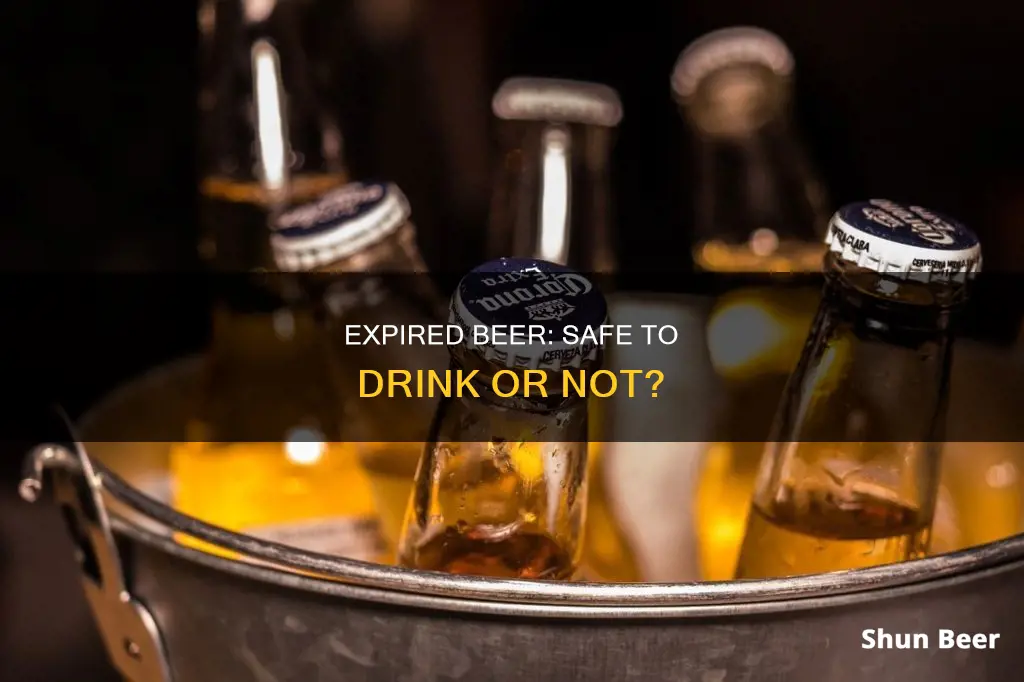
Drinking expired beer is something many people have experienced, and the good news is that it's unlikely to make you sick. The fermentation process used in brewing, along with the low pH level and alcohol content, creates an environment that is unfriendly to microorganisms. However, while it may not harm your health, drinking expired beer can be an unpleasant experience, as the taste and quality of the beer will have degraded over time.
| Characteristics | Values |
|---|---|
| Will drinking expired beer make you sick? | No, it will not make you sick. |
| Will drinking expired beer hurt you? | No, it will not hurt you. |
| Will drinking expired beer have any negative consequences? | It will likely taste bad. |
| What are the causes of bad taste in expired beer? | Oxidation, volatile aromas dissipating, light exposure, and temperature fluctuations. |
| How long does beer last at room temperature? | 5 to 9 months beyond the expiration date. |
| How long does beer last in the refrigerator? | Up to 2-3 years beyond the expiration date. |
| How long does opened beer last? | About a day, regardless of the expiration date. |
| How to identify expired beer? | By color, smell, taste, foam density, and overall appearance. |
What You'll Learn

Drinking expired beer is unlikely to make you sick
While drinking expired beer is unlikely to cause illness, it is important to note that the taste and quality of the beer may be significantly degraded. The volatile aromas from hops, which contribute to the characteristic hoppy aroma of certain beers like IPAs, tend to dissipate with age. Additionally, exposure to oxygen, heat, and light can cause off-flavors in beer.
To maintain the freshness of beer, it is recommended to store it in a cool, dark place, preferably a refrigerator. If stored at room temperature, it is crucial to keep the beer away from direct sunlight and heat sources. Upright storage also minimizes oxidation, helping to preserve the beer's original flavor.
While drinking expired beer is generally safe, it is always advisable to exercise caution. If the beer exhibits any signs of spoilage, such as a vinegary taste or a loss of carbonation, it is best to discard it.
In summary, while drinking expired beer is unlikely to cause illness, it may result in an unpleasant tasting experience due to the degradation of flavor and quality over time. Proper storage practices can help extend the shelf life of beer and maintain its freshness.
Beer and Liquor Mixing: Safe or Not?
You may want to see also

Beer's alcohol content and hops prevent pathogenic growth
Drinking expired beer will likely not make you sick, but it might taste bad. The fermentation process used in brewing, along with the low pH level and alcohol content, makes beer an unfriendly environment for microorganisms. Hops also play a role in inhibiting the growth of some bacteria, specifically those in the gram-positive group. However, the lethality of hops is not universal among the gram-positives, and they have no effect on gram-negative and other non-gram-positive pathogens.
The alcohol content of beer, therefore, acts as a preservative, preventing pathogenic growth. Ethanol can inhibit a number of pathogens, although some pathogens can survive in the presence of alcohol. For example, the pathogen Mycobacterium nonchromogenicum can survive over 75% ethanol. Nevertheless, the combination of ethanol, hops, and acidity in beer creates an environment that is lethal to most bacteria.
The foodborne pathogens Escherichia coli O157:H7 and Salmonella Typhimurium can survive in beer. They can survive for more than 30 days in mid-strength beer when held at 4°C, and they grew rapidly in alcohol-free beer. However, growth was prevented when the pH of the alcohol-free beer was lowered from 4.3 to 4.0.
In another study, E. coli O157:H7 and Salmonella enterica grew at 14°C in non-alcoholic beers, but no growth was observed at 4°C. Listeria monocytogenes was more susceptible and fell below the detection limit rapidly in all conditions tested. These studies demonstrate that while beer's alcohol content and hops can prevent pathogenic growth, storage temperature and pH also play a critical role in preventing the growth of pathogens.
Beer and Naproxen: Is It Safe to Mix?
You may want to see also

Expired beer will likely taste bad
Drinking expired beer will likely not make you sick, but it will probably taste bad. Beer doesn't expire in the same way that most food does. The alcohol content and the presence of hops, which have antimicrobial characteristics, prevent pathogenic bacterial growth. The worst thing that will happen to beer when it gets old is that it will taste bad.
The shelf life of beer varies depending on the type of beer and how it is stored. Beer stored in a refrigerator will last longer than beer stored at room temperature. Beer in unopened bottles or cans will last longer than beer that has been opened. Beer stored in a dark place will last longer than beer that is exposed to sunlight.
The flavour of beer changes over time, and what was once a refreshing treat could become a real stinker. Beers that are hop-heavy, like IPAs, are best consumed fresh. One of the first things that happen to beer as it ages is that volatile aromas, specifically those from hops, tend to dissipate. So, an IPA that is three or four months old might not have the same great hop characteristics as when it was fresh.
Beers with higher alcohol content, such as stouts and porters, tend to have a longer shelf life than lighter beers like lagers and pilsners. Beers stored in brown bottles will last longer than those stored in clear or green bottles, as brown glass offers better protection against ultraviolet light, which can cause beer to develop a skunky odour and taste. Canned beer is shielded from light and will last longer than bottled beer.
Drinking Beer with Nocor: Is It Safe?
You may want to see also

Beer should be stored in a cool, dark place
Exposure to sunlight and heat can cause chemical reactions in beer, breaking down its flavour components and creating an unpleasant taste and smell, often described as "skunky". This is why beer bottles are typically made of dark glass and why it is recommended to store beer in a cool, dark place.
The ideal temperature range for storing beer is between 45 and 55 degrees Fahrenheit (7-13 degrees Celsius). This range is slightly below room temperature and above typical refrigerator temperatures. Storing beer within this range will help slow down the aging process and prevent flavour loss.
If you don't have access to a temperature-controlled environment, a cool basement, a closet, or under the bed can also work. Just make sure the storage area is dark and away from direct sunlight. Additionally, it is important to store beer upright rather than on its side to minimise contact with oxygen, which can also affect the taste.
By following these storage guidelines, you can ensure that your beer stays fresh and flavourful for a longer period.
Beer and Intermittent Fasting: What You Need to Know
You may want to see also

Opened beer has a shelf life of about a day
Oxidation occurs when oxygen interacts with the compounds from malt, yeast, and hops — the building blocks of what makes beer delicious. This causes oxidation and a disappointing papery taste. Despite all the advanced techniques and newfangled technology brewers use to package beer, there’s still a tiny amount of oxygen that’ll make it into a can or bottle, which means a change in flavour is inevitable. And the longer it’s stored, the worse it gets.
Opened beer will generally only be good for a day before oxidation destroys all the good flavours. If you find yourself putting opened beers back in the fridge, it may be worth looking into resealable containers like growlers or even a keg. But even with resealable containers, opened beer is best consumed within a day or two for optimal taste.
The Science Behind Foam Beer Koozies: Do They Work?
You may want to see also
Frequently asked questions
No, drinking expired beer will not make you sick. Beer has antimicrobial characteristics due to its alcohol content and the presence of hops, which prevent pathogenic growth.
At room temperature, beer lasts about 5 to 9 months beyond its expiration date. In a refrigerator, beer can last up to an additional two to three years.
You can look out for signs such as a loss of fizz, indicating that the seal was broken, or a vinegary taste, which is a sign that bacteria has gotten into the beer.
To prevent your beer from expiring, store it in a cool, dark place, preferably a refrigerator. If you're storing it at room temperature, ensure that it is not exposed to sunlight. Additionally, keep the beer standing upright to minimize its exposure to oxygen.
Unopened beer will eventually go bad, typically after four to six months at room temperature. However, it won't necessarily be unsafe to drink, but the taste and quality may degrade over time.







